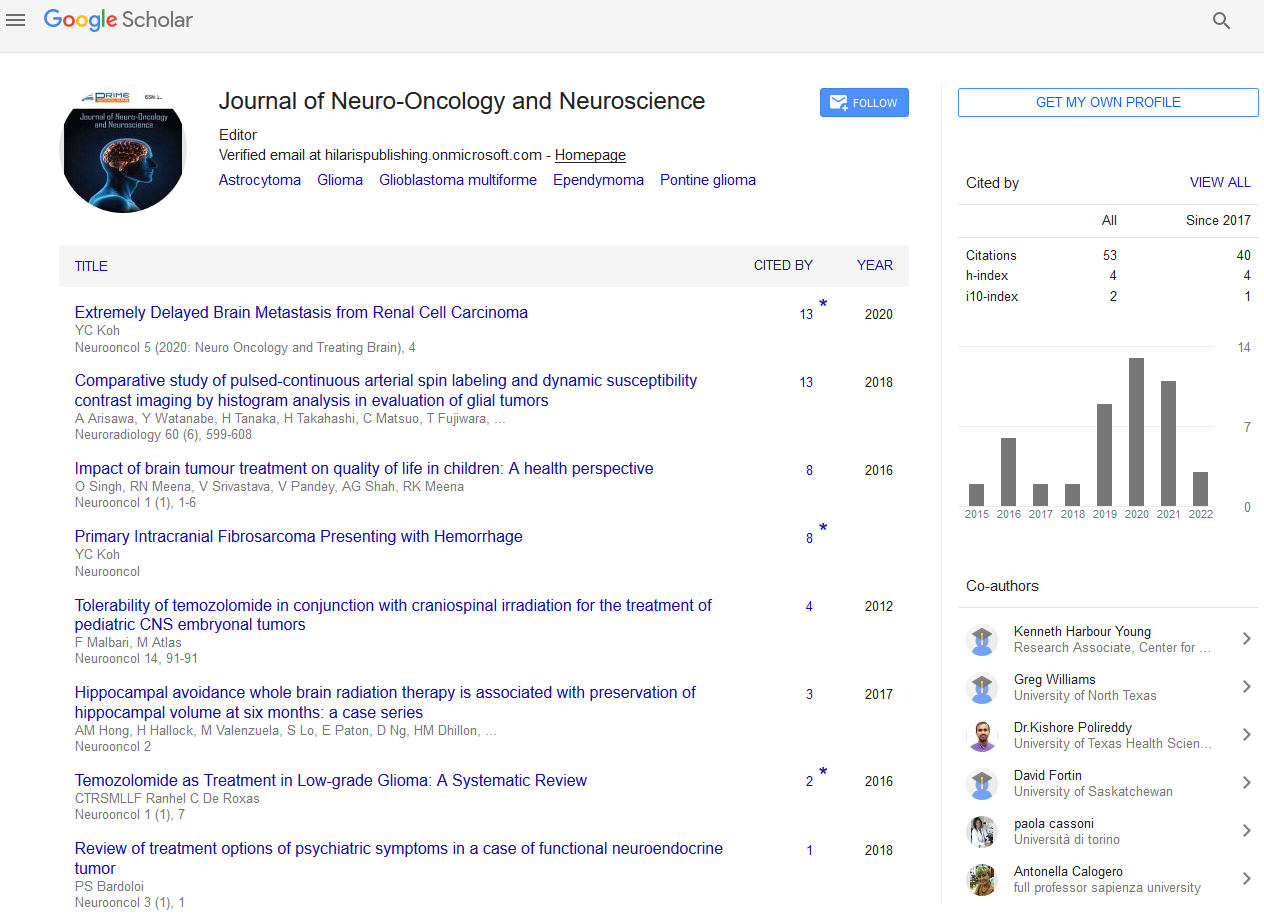Opinion - (2024) Volume 9, Issue 3
Long-Term Survivorship and Follow-Up Care in Brain Tumor Patients
Mann Thomas*
Department of Neuro Oncology, University of Pittsburgh, USA
*Correspondence:
Mann Thomas,
Department of Neuro Oncology, University of Pittsburgh,
USA,
Email:
Received: 02-Sep-2024, Manuscript No. IPJNO-24-21302;
Editor assigned: 04-Sep-2024, Pre QC No. IPJNO-24-21302 (PQ);
Reviewed: 18-Sep-2024, QC No. IPJNO-24-21302;
Revised: 23-Sep-2024, Manuscript No. IPJNO-24-21302 (R);
Published:
30-Sep-2024, DOI: 10.21767/2572-0376.9.3.25
Introduction
Surviving a brain tumor, whether benign or malignant, marks
the beginning of a complex and ongoing journey. While
advancements in treatment have improved survival rates,
the long-term survivorship and follow-up care for brain
tumor patients present unique challenges. These challenges
stem from the tumor itself, the effects of treatment, and the
psychological and social impacts of the disease. Addressing
these issues through comprehensive, multidisciplinary followup
care is essential to improving quality of life and ensuring
the best possible outcomes for survivors. Brain tumor survivors
face a range of physical, cognitive, and emotional challenges.
The location and type of the tumor, as well as the treatments
significantly influence the nature and severity of these
challenges. Cognitive deficits, including memory loss, attention
problems, and difficulties with executive function, are common
among brain tumor survivors. Neurological issues such as
seizures, motor function impairments, and speech difficulties
are also prevalent, necessitating ongoing neurological
assessment and rehabilitation.
Description
The psychological impact of a brain tumor diagnosis and
treatment can be profound. Survivors often experience anxiety,
depression, and fear of recurrence. The stigma and isolation
associated with brain tumors, coupled with potential changes
in appearance and cognitive function, can lead to significant
emotional distress. Long-term survivors may also face challenges
in returning to work or school, maintaining relationships, and
engaging in social activities. Long-term physical health issues
are common among brain tumor survivors. These can include
fatigue, hormonal imbalances and increased risk of secondary
cancers due to radiation exposure. Regular monitoring and
management of these health issues are crucial for maintaining
overall well-being. The frequency of these scans depends on
the type of tumor and the individual patient’s risk factors.
Regular neurological evaluations are also critical to monitor
cognitive and motor function, allowing for early intervention
if issues arise. Cognitive rehabilitation is a cornerstone of
follow-up care for brain tumor survivors. Tailored programs
that focus on memory, attention, and executive function can
help patients regain cognitive abilities and improve their daily
functioning. Physical therapy may also be necessary to address
motor impairments, while speech therapy can assist those with
communication difficulties. Addressing the emotional and social
needs of brain tumor survivors is a vital component of followup
care. Counseling and support groups can provide emotional
support, helping survivors cope with anxiety, depression, and
the fear of recurrence. Social workers and vocational counselors
can assist survivors in navigating the challenges of returning to
work or school and in rebuilding their social lives. Survivors
require ongoing management of long-term health issues,
such as hormonal imbalances, cardiovascular health, and the
risk of secondary cancers. Endocrinologists, cardiologists, and
other specialists should be involved in the long-term care plan,
ensuring that all aspects of the survivor’s health are addressed.
Conclusion
Long-term survivorship for brain tumor patients involves
navigating a range of physical, cognitive, and emotional
challenges. Comprehensive, individualized follow-up care is
essential to improving quality of life and ensuring that survivors
receive the support they need. A multidisciplinary approach,
encompassing regular monitoring, rehabilitation, psychosocial
support, and management of long-term health issues, is key
to helping brain tumor survivors thrive in the years following
their treatment. As survivorship continues to improve with
advancements in treatment, the importance of comprehensive
follow-up care becomes even more critical in supporting the
well-being of those who have battled brain tumors.
Citation: Thomas M (2024) Long-term Survivorship and Follow-up Care in Brain Tumor Patients. Neurooncol. 9:25.
Copyright: © 2024 Thomas M. This is an open-access article distributed under the terms of the Creative Commons Attribution License, which permits unrestricted use, distribution, and reproduction in any medium, provided the original author and source are credited.

